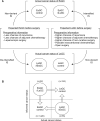Information-Stressors and Cancer Patients' Quality of Life: Responses to Deviant Information-Stressors Due to Pre-Postoperative Stage Discordance
- PMID: 32509557
- PMCID: PMC7250667
- DOI: 10.4068/cmj.2020.56.2.108
Information-Stressors and Cancer Patients' Quality of Life: Responses to Deviant Information-Stressors Due to Pre-Postoperative Stage Discordance
Abstract
This study assessed preoperative quality of life (QoL) of gastric cancer patients exposed to inconsistent illness information by pre-post-operative stage discordance. The impact of information-stressors on patients' QoL was investigated to determine information processing as a potential target for QoL management. Early-stage gastric cancer (EsGC) and late-stage gastric cancer (LsGC) groups based on their final stage were categorized by the consistency of preoperative staging information that was being shared. Those with consistent preoperative staging information were rated as EsGC (n=1,420) and LsGC (n=153) controls. EsGC and LsGC patients with misdirected information about their LsGC and EsGC were categorized as EsGC/iLsGC (n=32) and LsGC/iEsGC (n=55), respectively. Preoperative QoL data was obtained using EORTC QLQ-C30 and -STO22. QoL outcomes of EsGC/iLsGC and LsGC/iEsGC were compared with those of the EsGC and LsGC controls. QoL outcomes of the EsGC/iLsGC group matched that of EsGC control, but were significantly better than those of LsGC control on multiple scales including global health status/QoL, physical/role/social-functioning, and ten symptom scales/items. On the other hand, QoL outcomes of LsGC/iEsGC group were significantly better than those of LsGC control on multiple scales (global health status/QoL, physical/role-functioning, and nine symptom scales/items) while they roughly matched with those of EsGC control. Intensified information-stressors did not exacerbate QoL beyond the influence of the patients' medical condition, while de-intensified information-stressor improved QoL. Fear of negatively impacting QoL should not prevent the sharing of stressful illness information. As the de-intensified information-stressor improves QoL, information processing is recommended as a potential target for QoL management in cancer patients.
Keywords: Health Communication; Neoplasm Staging; Quality of Life; Stomach Neoplasms.
© Chonnam Medical Journal, 2020.
Conflict of interest statement
CONFLICT OF INTEREST STATEMENT: None declared.
Figures


Similar articles
-
Quality of life in cancer survivors 5 years or more after total gastrectomy: a case-control study.Int J Surg. 2014;12(7):700-5. doi: 10.1016/j.ijsu.2014.05.067. Epub 2014 May 24. Int J Surg. 2014. PMID: 24866069
-
The relationship between global and specific components of quality of life, assessed with the EORTC QLQ-C30 in a sample of 2019 cancer patients.Eur J Cancer Care (Engl). 2017 Mar;26(2). doi: 10.1111/ecc.12416. Epub 2015 Nov 16. Eur J Cancer Care (Engl). 2017. PMID: 26568527
-
Cross-Sectional Patient-Reported Outcome Measuring of Health-Related Quality of Life With Establishment of Cancer- and Treatment-Specific Functional and Symptom Scales in Patients With Penile Cancer.Clin Genitourin Cancer. 2018 Dec;16(6):e1215-e1220. doi: 10.1016/j.clgc.2018.07.029. Epub 2018 Aug 11. Clin Genitourin Cancer. 2018. PMID: 30201215
-
Quality of life assessment in Hodgkin's disease: a new comprehensive approach. First experiences from the EORTC/GELA and GHSG trials. EORTC Lymphoma Cooperative Group. Groupe D'Etude des Lymphomes de L'Adulte and German Hodgkin Study Group.Ann Oncol. 1998;9 Suppl 5:S147-54. doi: 10.1093/annonc/9.suppl_5.s147. Ann Oncol. 1998. PMID: 9926255 Review.
-
Comparison of the EORTC STO-22 and the FACT-Ga quality of life questionnaires for patients with gastric cancer.Ann Palliat Med. 2016 Jan;5(1):13-21. doi: 10.3978/j.issn.2224-5820.2016.01.02. Ann Palliat Med. 2016. PMID: 26841811 Review.
Cited by
-
Quality of Life of Young Gastric Cancer Survivors: An Interpretation in the Context of Our Society.Medicina (Kaunas). 2023 Dec 20;60(1):9. doi: 10.3390/medicina60010009. Medicina (Kaunas). 2023. PMID: 38276043 Free PMC article.
-
Impact on quality of life with affirmative feedback on weight loss after gastrectomy.Sci Rep. 2023 Sep 18;13(1):15454. doi: 10.1038/s41598-023-42695-w. Sci Rep. 2023. PMID: 37723236 Free PMC article.
References
-
- Lee SS, Chung HY, Kwon O, Yu W. Long-term shifting patterns in quality of life after distal subtotal gastrectomy: preoperative- and healthy-based interpretations. Ann Surg. 2015;261:1131–1137. - PubMed
-
- Chittem M, Butow P. Responding to family requests for nondisclosure: the impact of oncologists' cultural background. J Cancer Res Ther. 2015;11:174–180. - PubMed
LinkOut - more resources
Full Text Sources
Research Materials

